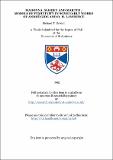Madonna, maiden and martyr : models of femininity in some early works of André Gide and D. H. Lawrence
Abstract
This dissertation studies certain similarities between some early Bildungsroman of D. H. Lawrence and André Gide. In Lawrence's Sons and Lovers and The Rainbow, and Gide's L'lmmoraliste and La Porte étroite, the authors explore the destructive effects of cultural "Icons", narrowly codified gender roles, upon sensitive young European women at the turn of the century. Through an intricate subtext of allusive imagery, postures, language, and "mythical" patterns, Lawrence and Gide imply that a patristic Christianity had somehow enlisted certain strains of Romance to fashion a pervasive cultural code that encouraged young women to be virginal, passive, and receptive to suffering. The young female protagonists look to their roles as Madonna, Maiden, and Martyr as an escape from a provincial world that offers little to their "over brimming" souls. Ironically, it is their Knight-Christs, the "mentors" who propose to teach them about the higher world, who imprison them further. Pretending to elevate them to the status of Spiritual Muse to inspire the male quest for selfhood, the lovers demand of their Madonna-Maidens a passivity whereby suffering is their only "heroic" act. Male-sculpted models of femininity, then, make it impossible for young women to pursue their own quests for the authentic "self". The final tragedy for the young women comes when their opposite numbers awaken from Romance's pregenital spring to what Lawrence calls "blood-consciousness". The Maidens' Knight-Christs now find restrictive their spiritual lovers and desire instead the initiation into the "flesh" preached by a new cultural code, that of Nietzsche et al. Lawrence's and Gide's young female characters, then, serve as exemplars of an entire generation of young women destroyed in this teleological shift to a new cultural ethos, one in which, suddenly, their "virtues" are judged vices, all they had been presented to them as "natural" is deemed "unnatural".
Type
Thesis, PhD Doctor of Philosophy
Collections
Items in the St Andrews Research Repository are protected by copyright, with all rights reserved, unless otherwise indicated.

